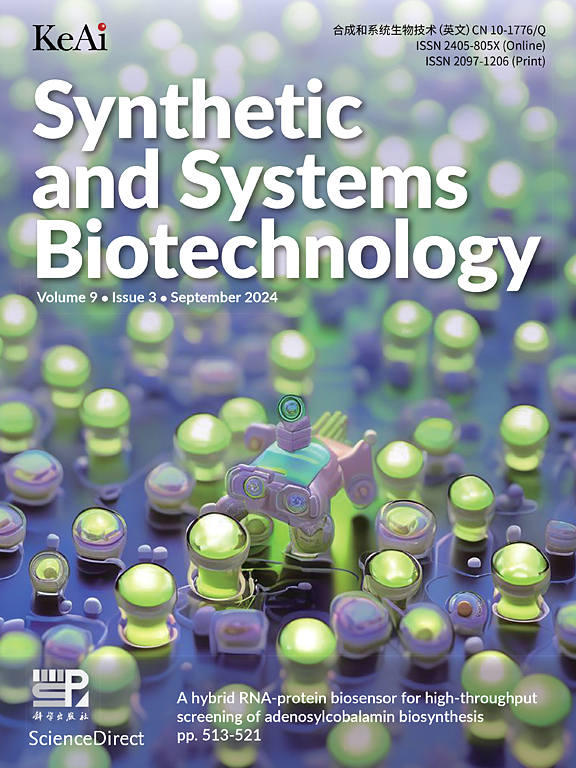CRISPR/Cas9-based iterative multi-copy integration for improved metabolite yields in Saccharomyces cerevisiae
IF 4.4
2区 生物学
Q1 BIOTECHNOLOGY & APPLIED MICROBIOLOGY
引用次数: 0
Abstract
High-copy integration of key genes offers a promising strategy for efficient biosynthesis of valuable natural products in Saccharomyces cerevisiae. However, traditional multi-copy gene integration methods meet challenges including low efficiency and labor-intensive screening processes. In this study, we developed the IMIGE (Iterative Multi-copy Integration by Gene Editing) system, a CRISPR/Cas9-based approach that exploits both δ and rDNA repetitive sequences for simultaneous multi-copy integrations in S. cerevisiae. This system combines the mixture of Cas9-sgRNA expression vectors with a split-marker strategy for efficient donor DNA assembly in vivo and enables rapid, iterative screening through growth-related phenotypes. When applied to the biosynthesis of ergothioneine and cordycepin, the IMIGE system achieved significant yield improvements, with titers of 105.31 ± 1.53 mg/L and 62.01 ± 2.4 mg/L, respectively, within just two screening cycles (5.5–6 days in total). These yields represent increases of 407.39 % and 222.13 %, respectively, compared to the strains with episomal expression. By streamlining the integration process, utilizing growth-based selection, and minimizing screening demands in both equipment and labor, the IMIGE system could provide an efficient and scalable platform for high-throughput strain engineering, facilitating enhanced microbial production of a wide range of bioproducts.

基于CRISPR/ cas9的迭代多拷贝整合提高酿酒酵母代谢物产量
关键基因的高拷贝整合为酿酒酵母高效生物合成有价值的天然产物提供了一种有前途的策略。然而,传统的多拷贝基因整合方法存在效率低、筛选过程费力等问题。在这项研究中,我们开发了IMIGE (Iterative Multi-copy Integration by Gene Editing)系统,这是一种基于CRISPR/ cas9的方法,利用δ和rDNA重复序列在酿酒酵母中同时进行多拷贝整合。该系统结合了Cas9-sgRNA表达载体与分裂标记策略的混合物,用于体内高效的供体DNA组装,并通过生长相关表型进行快速迭代筛选。当应用于麦角硫因和虫草素的生物合成时,IMIGE系统在两个筛选周期(总共5.5-6天)内获得了显著的产量提高,滴度分别为105.31±1.53 mg/L和62.01±2.4 mg/L。与外生表达菌株相比,产量分别提高了407.39%和222.13%。通过简化整合过程,利用基于生长的选择,并最大限度地减少设备和劳动力的筛选需求,IMIGE系统可以为高通量菌株工程提供高效和可扩展的平台,促进多种生物制品的微生物生产。
本文章由计算机程序翻译,如有差异,请以英文原文为准。
求助全文
约1分钟内获得全文
求助全文
来源期刊

Synthetic and Systems Biotechnology
BIOTECHNOLOGY & APPLIED MICROBIOLOGY-
CiteScore
6.90
自引率
12.50%
发文量
90
审稿时长
67 days
期刊介绍:
Synthetic and Systems Biotechnology aims to promote the communication of original research in synthetic and systems biology, with strong emphasis on applications towards biotechnology. This journal is a quarterly peer-reviewed journal led by Editor-in-Chief Lixin Zhang. The journal publishes high-quality research; focusing on integrative approaches to enable the understanding and design of biological systems, and research to develop the application of systems and synthetic biology to natural systems. This journal will publish Articles, Short notes, Methods, Mini Reviews, Commentary and Conference reviews.
 求助内容:
求助内容: 应助结果提醒方式:
应助结果提醒方式:


